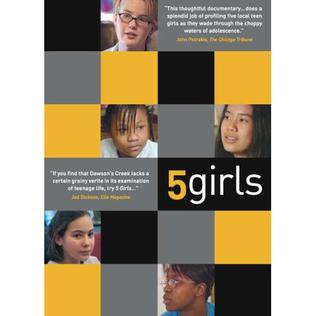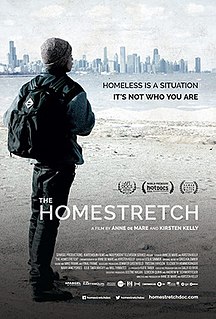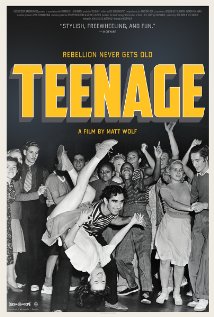 W
W5 Girls is a documentary released in 2001 by Kartemquin Films for PBS's P.O.V. series. The film follows five young women between the ages of 13 and 17.
 W
WThe Bad Kids is a 2016 documentary film about students at risk of dropping out who attend an alternative school in Yucca Valley, California.
 W
WBeyond Clueless is a 2014 British documentary film about teen movies, directed by Charlie Lyne, narrated by Fairuza Balk and with an original soundtrack by Summer Camp. The film features extracts from over 200 teen movies, with a particular emphasis on those released between 1995 and 2004.
 W
WThe Boys from Baghdad High, also known as Baghdad High, is a British-American-French television documentary film. It was first shown in the United Kingdom at the 2007 Sheffield Doc/Fest, before airing on BBC Two on 8 January 2008. It also aired in many other countries including France, Australia, the United States, Canada, Germany and the Netherlands. It documents the lives of four Iraqi schoolboys of different religious or ethnic backgrounds over the course of one year in the form of a video diary. The documentary was filmed by the boys themselves, who were given video cameras for the project.
 W
WChain Camera is a 2001 American documentary film directed by Kirby Dick about the lives of Los Angeles high school students. It premiered at the 2001 Sundance Film Festival.
 W
WCyber Seniors is a 2014 documentary film directed by Saffron Cassaday about reluctant seniors who with the help of teenage mentors discover the wonders of the world-wide-web.
 W
WGuidelines is a 2014 Quebec feature-length documentary by Jean-François Caissy about adolescent students at the École Antoine Bernard high school in the rural community of Carleton-sur-Mer, in the Gaspésie–Îles-de-la-Madeleine region. The film uses a fly on the wall style of documentary storytelling as it chronicles such issues as drug use, bullying and disruptive behaviour, while contrasting school life with the freedom of the outdoors. In conversations between teachers or social workers and students, Caissy often makes use of a fixed camera, so that voices of adult authority are off-screen and unseen.
 W
WThe Homestretch is a 2014 American documentary film produced and directed by Anne de Mare and Kirsten Kelly. De Mare and Kelly intended the film to serve as a challenge to the negative stereotypes of youth homelessness. The film premiered at the 2014 HotDocs Film Festival on April 26, 2014. It went on to play at the 2014 AFI Docs Film Festival and the 2014 Human Rights Watch Film Festival.
 W
WHoop Dreams is a 1994 American documentary film directed by Steve James, and produced by Frederick Marx, James, and Peter Gilbert, with Kartemquin Films. It follows the story of two African-American high school students, William Gates and Arthur Agee, in Chicago and their dream of becoming professional basketball players.
 W
WHot Girls Wanted is a 2015 American documentary film directed by Jill Bauer and Ronna Gradus. The film follows the lives of several 18- and 19-year-old pornographic actresses. The film premiered at the 2015 Sundance Film Festival and was released on Netflix on May 29, 2015.
 W
WI Am a Girl is a 2013 documentary that follows six girls aged between 17 and 19 from the United States, Australia, Cambodia, Afghanistan, Cameroon, and Papua New Guinea, highlighting issues of gender inequality, domestic abuse, mental health and family planning. The story is told through interviews with the girls and cinematic observational footage as they experience important events and rites of passage in their life. The film's producer and director, Rebecca Barry, is a filmmaker from Australia. The film is distributed by Women Make Movies in North America, Titan View in Australia, and TVF International in the rest of the world.
 W
WMostar Round-Trip is a 2011 Israeli documentary film, a Fisher Features Ltd. release directed and produced by David Fisher. The film follows his son, Yuval and his classmates who are studying in an international high-school, United World College, in Mostar, Bosnia and Herzegovina.The film also exposes the recuperating city, which has been greatly damaged during the Bosnian War and is now geographically divided between the Bosniak and Croat populations. This is the second film in the family trilogy created by Fisher that started with the critically acclaimed Love Inventory (2000) and completed by Six Million and One (2011).
 W
WA Reason to Live is a 2009 documentary film about teen and young adult depression and suicide. It captures twelve personal stories of despair and hope, told by young people of different ages, ethnicities and sexual orientations, and their families. It was produced and directed by Allen Mondell and Cynthia Salzman Mondell of Media Projects, Inc.
 W
WTeenage is a 2013 documentary film directed by Matt Wolf and based on Jon Savage's book Teenage: The Creation of Youth Culture. In the documentary, Wolf attempts to bring to life the "prehistory" of youth culture which preceded and evolved into the concept of teenage culture in the 1950s and beyond. The film had its world premiere at the Tribeca Film Festival on April 20, 2013. and was released in a limited release and through video on demand on March 14, 2014, by Oscilloscope Laboratories.
 W
WTen9Eight: Shoot for the Moon is a 2009 documentary film about inner New York City teenagers who compete in an annual business plan competition run by the Network for Teaching Entrepreneurship (NFTE) written, directed, and produced by Mary Mazzio.
 W
WThey Call Us Misfits is a Swedish documentary film which was released to cinemas in Sweden on 25 March 1968, directed, produced and written by Stefan Jarl and Jan Lindqvist. The film is an uncompromising account of the life of two alienated teenagers, Kenneth "Kenta" Gustafsson (1948–2003) and Gustav "Stoffe" Svensson (1950–1978). The film, like its successor Ett anständigt liv takes a close but non-moralizing look at the joys and growing pains of mod and "junkie" street culture in Stockholm at the time.
 W
WUnderwater Dreams is a documentary film written, directed, and produced by Mary Mazzio. The film chronicles the story of how the sons of undocumented Mexican immigrants learned how to build underwater robots, and go up against MIT in the process.
 W
WThe Up series is a series of documentary films produced by Granada Television for ITV that follows the lives of fourteen British children since 1964, when they were seven years old. The documentary has had nine episodes—one episode every seven years—thus spanning 56 years. All were broadcast on ITV, apart from the sixth episode that was broadcast on BBC One. Individual films and the series as a whole have received numerous accolades; the fourth episode, 28 Up, was chosen for Roger Ebert's list of the ten greatest films of all time.